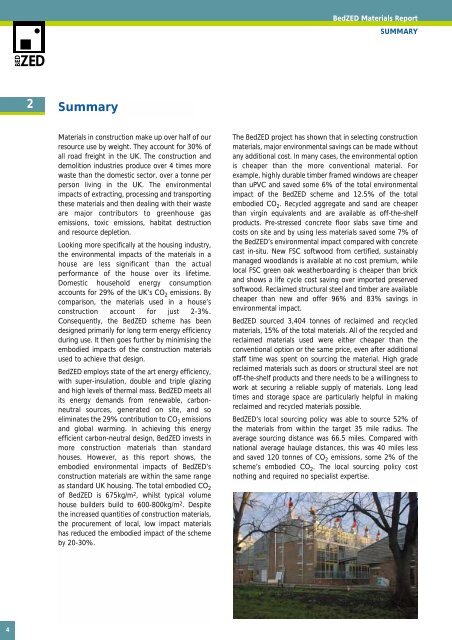Construction Materials Report - BioRegional
Construction Materials Report - BioRegional
Construction Materials Report - BioRegional
Create successful ePaper yourself
Turn your PDF publications into a flip-book with our unique Google optimized e-Paper software.
4<br />
2<br />
Summary<br />
<strong>Materials</strong> in construction make up over half of our<br />
resource use by weight. They account for 30% of<br />
all road freight in the UK. The construction and<br />
demolition industries produce over 4 times more<br />
waste than the domestic sector, over a tonne per<br />
person living in the UK. The environmental<br />
impacts of extracting, processing and transporting<br />
these materials and then dealing with their waste<br />
are major contributors to greenhouse gas<br />
emissions, toxic emissions, habitat destruction<br />
and resource depletion.<br />
Looking more specifically at the housing industry,<br />
the environmental impacts of the materials in a<br />
house are less significant than the actual<br />
performance of the house over its lifetime.<br />
Domestic household energy consumption<br />
accounts for 29% of the UK’s CO2 emissions. By<br />
comparison, the materials used in a house’s<br />
construction account for just 2-3%.<br />
Consequently, the BedZED scheme has been<br />
designed primarily for long term energy efficiency<br />
during use. It then goes further by minimising the<br />
embodied impacts of the construction materials<br />
used to achieve that design.<br />
BedZED employs state of the art energy efficiency,<br />
with super-insulation, double and triple glazing<br />
and high levels of thermal mass. BedZED meets all<br />
its energy demands from renewable, carbonneutral<br />
sources, generated on site, and so<br />
eliminates the 29% contribution to CO2 emissions<br />
and global warming. In achieving this energy<br />
efficient carbon-neutral design, BedZED invests in<br />
more construction materials than standard<br />
houses. However, as this report shows, the<br />
embodied environmental impacts of BedZED’s<br />
construction materials are within the same range<br />
as standard UK housing. The total embodied CO2 of BedZED is 675kg/m2, whilst typical volume<br />
house builders build to 600-800kg/m2. Despite<br />
the increased quantities of construction materials,<br />
the procurement of local, low impact materials<br />
has reduced the embodied impact of the scheme<br />
by 20-30%.<br />
BedZED <strong>Materials</strong> <strong>Report</strong><br />
SUMMARY<br />
The BedZED project has shown that in selecting construction<br />
materials, major environmental savings can be made without<br />
any additional cost. In many cases, the environmental option<br />
is cheaper than the more conventional material. For<br />
example, highly durable timber framed windows are cheaper<br />
than uPVC and saved some 6% of the total environmental<br />
impact of the BedZED scheme and 12.5% of the total<br />
embodied CO2. Recycled aggregate and sand are cheaper<br />
than virgin equivalents and are available as off-the-shelf<br />
products. Pre-stressed concrete floor slabs save time and<br />
costs on site and by using less materials saved some 7% of<br />
the BedZED’s environmental impact compared with concrete<br />
cast in-situ. New FSC softwood from certified, sustainably<br />
managed woodlands is available at no cost premium, while<br />
local FSC green oak weatherboarding is cheaper than brick<br />
and shows a life cycle cost saving over imported preserved<br />
softwood. Reclaimed structural steel and timber are available<br />
cheaper than new and offer 96% and 83% savings in<br />
environmental impact.<br />
BedZED sourced 3,404 tonnes of reclaimed and recycled<br />
materials, 15% of the total materials. All of the recycled and<br />
reclaimed materials used were either cheaper than the<br />
conventional option or the same price, even after additional<br />
staff time was spent on sourcing the material. High grade<br />
reclaimed materials such as doors or structural steel are not<br />
off-the-shelf products and there needs to be a willingness to<br />
work at securing a reliable supply of materials. Long lead<br />
times and storage space are particularly helpful in making<br />
reclaimed and recycled materials possible.<br />
BedZED’s local sourcing policy was able to source 52% of<br />
the materials from within the target 35 mile radius. The<br />
average sourcing distance was 66.5 miles. Compared with<br />
national average haulage distances, this was 40 miles less<br />
and saved 120 tonnes of CO2 emissions, some 2% of the<br />
scheme’s embodied CO2. The local sourcing policy cost<br />
nothing and required no specialist expertise.


